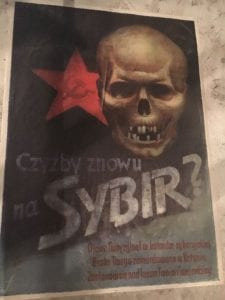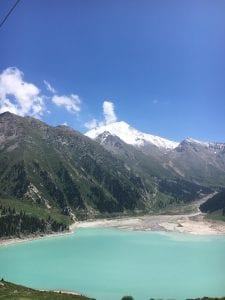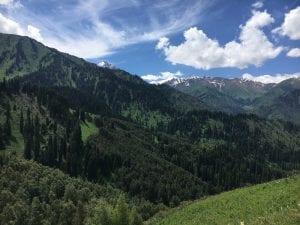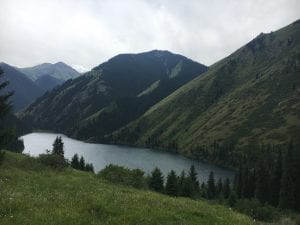By Pietro Shakarian, graduate student in the Department of History
Tengiz Abuladze’s Repentance is the story of a woman, a family, a village, and a dictator, a film so fantastic, absurd, dark, and subversive that it was ultimately banned in the Soviet Union, perhaps fittingly, in the year 1984.

Sofiko Chiaureli as Pupala in Abuladze’s “The Wishing Tree”
The backstory of Repentance is a classic yet not unfamiliar one, a tale of a struggle between artistic freedom and state censorship. Produced by Gruziafilm, the state film company of Soviet Georgia, the film was conceived as one of a trilogy of films directed by Abuladze that highlight the human condition. The other two earlier films included The Plea in 1967, about a centuries-old feud between two Georgian villages, and The Wishing Tree in 1976, the story of a romance destroyed by social tradition. The third and final installment of Abuladze’s series, Repentance, is a blistering attack on authoritarianism in general and on Stalinism in particular. For Abuladze, Stalin was of special significance because he was not an ethnic Russian but, like Abuladze himself, an ethnic Georgian.
From here, Abuladze and his daughter-in-law, Nana Janelidze, set to work on writing the film. At the time, the Soviet Union was under the rule of Leonid Brezhnev and the leader of Soviet Georgia was Eduard Shevardnadze. Abuladze presented his script to the Georgian leader. Shevardnadze, whose own family had been victims of Stalin’s terror, immediately fell in love with it and gave Abuladze his blessing. After casting the actors and laying the groundwork for the production, Abuladze proceeded to shoot the film and, within five months in 1984, finished it.
Unfortunately for Abuladze, Konstatin Chernenko, a protégé of Brezhnev, banned the film for its subversive “anti-Soviet” content and even attempted to have it destroyed. However, for better or worse, Chernenko’s tenure was extremely short-lived. After barely one year in office, the ailing 74-year-old Ukrainian died of heart failure and in his place came reform-minded Mikhail Gorbachev who, upon ascending to power, appointed Eduard Shevardnadze to the Politburo.
Seizing the moment, Abuladze immediately phoned Shevardnadze and asked if he could use his newfound influence to encourage release of the film. Shevardnadze agreed and arranged a screening with Gorbachev. When the film ended, Gorbachev, recalling his own grandfather’s arrest during the Stalin years, apparently had tears in his eyes. He expressed his enthusiasm for the film and gave the go-ahead for its release.
It was decided by Aleksandr Yakovlev to gradually leak the film to Soviet audiences. The first screenings were held in October 1986 and eventually spread throughout the country. Attracting tens of millions of people, the film quickly became, in Gorbachev’s words, “a real bombshell,” an “artistic and a political phenomenon” that paved the way for more frank and open public discussions on Stalinism. Indeed, the film served as cultural flagship for glasnost.

Ketevan’s cakes (left) decorated in the style of churches found in the Caucasus (right)
Repentance encompasses drama, comedy, fantasy, and surrealism into one tight-knit package. Its message is extremely subversive, hitting at the very core of the Soviet Communist Party’s raison d’être. It opens on Ketevan Barateli (Zeinab Botsvadze), a middle-aged woman who decorates cakes with Caucasus-style churches. From a newspaper, she learns of the death of the local mayor, a provincial despot named Varlam Aravidze (Avtandil Makharadze). With a Stalinist personality cult, a Hitlerian mustache, a touch of Mussolini bravado, and the pince-nez of Stalin’s secret police chief Lavrentiy Beria, Aravidze was the quintessential dictator whose very surname “Aravidze” literally translates as “no one” in the Georgian language.

Varlam
It is gradually revealed that Ketevan’s parents were victims of Varlam’s terror and, in her daydream, she imagines digging up his corpse to ensure that his crimes are never forgotten. Eventually discovered, she is immediately taken to trial, where an assembly of offbeat judges (including one who is preoccupied with a Rubik’s Cube), debate her ultimate destiny. Ketevan tells the court how Varlam came to power, how he terrorized the town and her family, how he blew-up a beautiful medieval Georgian church to make way for “more grand, scientific constructions,” and how his armor-clad, Oprichniki-esque secret police arrested her parents Sandro (Edisher Giorgobiani) and Nino (Ketevan Abuladze).

Sandro Barateli as Christ
Her father Sandro, an artist, was a defender of the church that was ultimately destroyed (recalling Stalin’s 1931 demolition of the Cathedral of Christ the Savior in Moscow). He becomes a Christ-like figure and a martyr to Varlam’s repressive and paranoid policies. His ultimate death is, as film scholar Birgit Beumers wrote, “paralleled with the death of Christ, by the coincidence of his death with the destruction of the church and his position of a crucified man. Christian morality is annihilated together with the individual defending it.”
The sequence of Varlam’s coming to poweris one of the most iconic in the entire film. It opens on Ketevan at the age of eight, blowing soap bubbles from her parents’ apartment window. Varlam has just been elected (or appointed) mayor, an event that causes much pomp and circumstance. Locals gather to hear the grand speeches, as a Dziga Vertov-esque “man with a movie camera” films the scene, and an effigy of a top-hatted capitalist fat cat is burned.
Suddenly, sewer workers hit a water leak that rains on everyone and everything (Abuladze’s tongue-in-cheek way of saying that “the system is broken”). Accompanied by classical music, the speeches become nonsense, ridiculous paeans to the “dear leader” Varlam. The speeches must be transcribed on-the-spot by a female typist, who like the speakers, is getting soaked by water. As the audience enthusiastically applauds, Varlam takes the stand and begins to speak as a hangman’s noose ominously stands in the background, foreshadowing the terror to come. Sandro the artist is unimpressed. He takes in Nino and Ketevan and shuts the apartment window on Varlam’s blustery speech – a detail that Varlam does not miss.
The most powerful shots in the film occur after Sandro is arrested. Nino, his wife and Ketevan’s mother, is hysterical with bereavement. In desperation, she and her daughter search for any trace of Sandro. They head to a long, seemingly endless “grievous line of women (future widows) and children (future orphans) waiting at the prison windows,” to send him a letter.

One of Ketevan’s judges, preoccupied with a Rubik’s Cube
As the haunting sound of 1930s Soviet-era waltzes echoes in the background, one older woman is coolly told that her husband has been “exiled without correspondence.” In response, she screams to the official “stop torturing us! Say that he’s dead! Say that he’s dead!” She is taken away sobbing by the ominous hand of the secret police. When Nino and Ketevan are also told that Sandro is “exiled without correspondence,” they quietly decide not to make a fuss.
Later, Nino’s young nephew (Ketevan’s cousin) tells them that lumber produced from the forced labor camp bearing the names of the exiled has arrived at the local railroad station. Desperately hoping to find a mark from Sandro, Nino runs to the station with Ketevan. Sadly, no trace of him can be found, and symbolically, the lumber is shredded into sawdust, just as the memories of Varlam’s – and by extension Stalin’s – victims are shredded into obscurity. In cruel irony, paper will be made from the sawdust and portraits of Varlam will be printed on them. As one Soviet critic wrote at the time of the film’s release, “This is our own history. This is 1937.”
Considering its powerful message, biting political commentary, artistic historical illusions, master theatricality, superb acting, camera, and brilliant use of magical realism, Repentance is a milestone. It is a milestone not only in the history of Soviet, Russian, and Georgian cinema, but also in world cinema. It is an underrated classic, a film that deserves to be discovered by all. The full film can be viewed here.

























